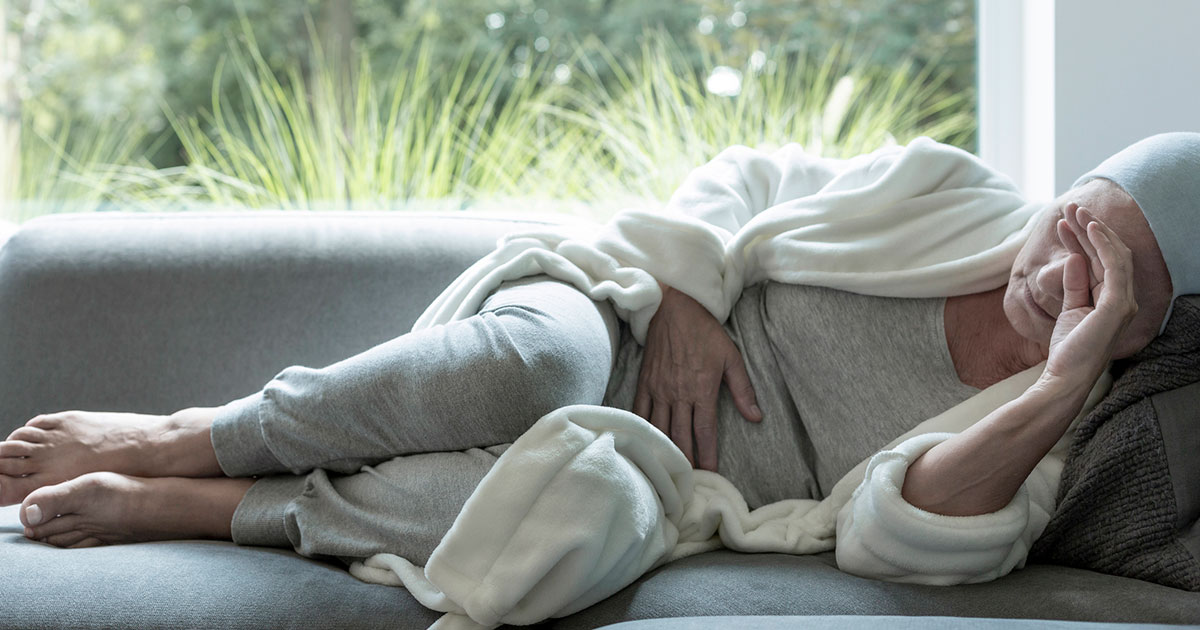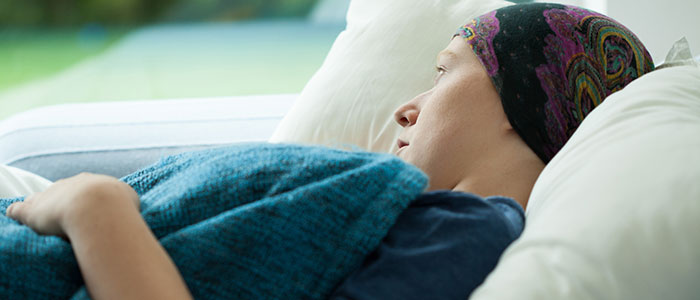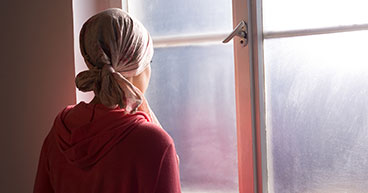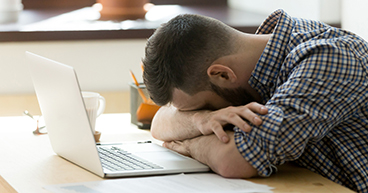
Tired? Try taking a nap, drinking a cup of coffee, eating a or taking a brisk walk around the block. Any or all of these solutions may help put the giddy-up back in your day.
But for cancer patients, these steps are often not enough because they’re more than tired. They’re battling fatigue brought on by cancer and/or its treatments. Fatigue is among the most common symptom or side effect of cancer. In fact, the American Cancer Society (ACS) says that almost all cancer patients report experiencing fatigue beyond what they may consider normal tiredness.
“The fatigue felt by people with cancer is different from the fatigue of daily life and different from the tired feeling people might remember having before they had cancer,” the ACS says.
Cancer may damage organs, weaken muscles and impact cells that carry oxygen throughout the body. And if the cancer itself doesn’t cause fatigue, treatments such as chemotherapy and radiation therapy may. The emotional toll of cancer—stress, anxiety and fear—may also cause a seemingly endless state of exhaustion.
“Fatigue was one of the biggest issues I dealt with,” says Anthony Perre, MD, New Patient Intake Physician at City of Hope Atlanta and a Hodgkin lymphoma survivor. “For many survivors, it's one of those things that’s very difficult to deal with because of the emotional aspect that goes along with it. Fatigue is not something that goes away immediately once you're done with treatment. There’s concern and fear that the cancer is still present, which is why, for some survivors, fatigue may last years. For me, I would say that it probably lasted at least 18 months.”
In this article, we’ll explore cancer-related fatigue and how it differs from everyday tiredness. Topics include:
- What is cancer-related fatigue?
- What does cancer-related fatigue feel like?
- What causes cancer-related fatigue?
- How can you manage cancer-related fatigue?
If you’re experiencing fatigue during cancer treatment, we may be able to help. Our multidisciplinary team of cancer experts takes an integrative approach to treating cancer and its side effects. Call us or chat online with a member of our team.

What is cancer-related fatigue?
A cancer diagnosis comes with baggage stuffed with physical and mental health issues that can become burdensome and difficult to carry. These persistent challenges often kick normal tiredness to a new level.
The root causes of an individual patient’s fatigue and how long-lasting it will be vary widely from patient to patient. Some patients may bounce back after their treatment ends. For others, the symptoms of fatigue may persist for months, even years. Some patients may experience fatigue because of emotional issues. For others, it may be triggered by treatment-related physical changes.
But the one common thread is that cancer-related fatigue often stops them from their normal routines.
“Fatigue was a huge factor for the first six or seven months after surgery, no doubt about it,” says Rev. Percy McCray Jr., National Director of Faith-Based Programs for City of Hope Atlanta, Chicago and Phoenix and a colorectal cancer survivor. “I'll be going along feeling fine and feel like that I can kind of do my normal activities, then absolutely just crash and have zero energy.
“For me, being kind of a high-energy guy, I'm thinking I can push and power through that,” he adds. “But, no, I would have to take frequent naps and sleep longer than usual.”
What does cancer-related fatigue feel like?
It’s one thing to be tired after a long day of work, fun activities or just the daily chores of life. And many people can power through being tired until bedtime or recharge with a midday nap. Fatigue doesn’t work that way.
“Cancer-related fatigue isn’t the same as what you may have felt before your diagnosis,” City of Hope Chicago Medical Oncologist Eugene Ahn, MD, wrote in a blog about fatigue on CancerCenter360.
For Rev. McCray, the symptoms of his fatigue went beyond physical malaise and muscle weakness. It also affected his cognitive abilities.
“The fatigue related to my cancer was like a weight I simply couldn't push off,” he says. “There would be times when I’d feel absolutely fine, but then the bottom just fell out and I’d crash physically and could not go a step further. My body would not respond or react. I just literally had to stop in my tracks. I would just nod out or become incoherent, where I just could not really react or respond to you in any way.”
What causes cancer-related fatigue?
The better question may be: Which aspect of cancer doesn’t cause fatigue? “Fatigue is often multifactorial, meaning more than one contributing factor may be involved, and none of them may be cancer,” Dr. Ahn wrote.
Potential causes of low energy levels brought on by cancer may include one or a combination of the following:
- Cancer treatments or medicines, especially chemotherapy and radiation therapy
- Anemia, a low red blood-cell count
- Anxiety, stress and depression
- Lack of sleep
- Malnutrition caused by a loss of appetite or the inability to process food into energy
- Dehydration from vomiting or diarrhea
- Hormone imbalances, such as low levels of testosterone
- Other health conditions, such as heart disease or obesity
Also, cancer is more common in older adults, and older people may be more likely to experience cancer-related fatigue.
“There are definitely causes for fatigue that should be considered by your physician and may be treated,” Dr. Perre says.
How can you manage cancer-related fatigue?
You can’t see or touch fatigue, so it may be difficult for those not experiencing it to understand the depths of its effects on others. And because cancer-related exhaustion may be “multifactorial,” as Dr. Ahn described it, identifying the causes may be difficult.
But cancer patients shouldn’t just accept the persistent lack of energy as a new normal, Dr. Perre says. Your doctor may be able to address lifestyle factors, medical conditions and other factors that may be contributing to feelings of fatigue.
“When it affects your quality of life and the ability to do the things you enjoy, that's where fatigue becomes a medical issue,” he says. “All of us have experienced just feeling tired. Maybe we didn't sleep well or had a million things going on and did a lot of activities that required exertion. And we get tired. But that's different than the kind of overwhelming fatigue that drives you to want to get to the root of the cause and address it.”
Dr. Perre says he’ll check patients for anemia, determine whether anxiety or depression is a factor, make sure they’re getting enough nutrition and address sleep problems, all of which are common for cancer patients.
Difficulty sleeping is one of many contradictions when addressing feelings of fatigue. Patients with extreme exhaustion caused by cancer and its treatments often get poor sleep. And if they can get a good night’s sleep, it doesn’t always help relieve the fatigue.
“It’s more than just feeling tired,” Dr. Ahn wrote. “And it doesn’t go away when you get enough sleep or rest.”
“About half of all cancer survivors have a sleep disorder,” Dr. Perre says. “We’ll want to address their sleep hygiene and make sure they don't have an underlying condition, like sleep apnea.”
Other potential treatment options for fatigue include:
- Behavioral health services such as counseling
- Support groups
- Massage
- Relaxing activities that focus on mindfulness, such as yoga
- Changes in dosage for medicines that make the fatigue worse
Another counter-intuitive approach to fatigue: Dr. Perre recommends patients also stay physically active and regular exercise.
“We want to make sure they're getting 30 minutes of exercise, five days a week, to help reduce the fatigue patients experience,” he says. “Sometimes, you really have to push yourself. Look at it this way: Some things you have some control over that can reduce symptoms, and physical activity is one of them.”
If you’re experiencing fatigue during cancer treatment, we may be able to help. Our multidisciplinary team of cancer experts takes an integrative approach to treating cancer and its side effects. Call us or chat online with a member of our team.



